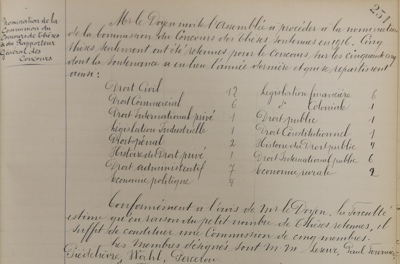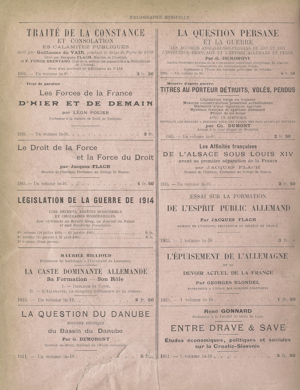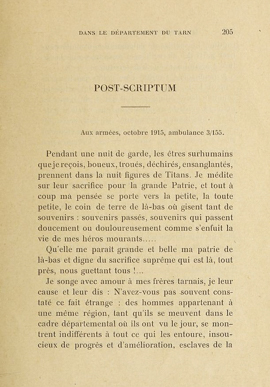The Paris Faculty of Law in the war for law
The First World War was a pivotal moment for the Paris Faculty of Law. As the largest law school in France, it soon had to deal with an exceptional situation that deprived it of part of its students and professors. Under the impetus of its dean, Ferdinand Larnaude, the faculty was put at the service of France’s war against Germany, an intellectual struggle of law against force that enrolled both professors and students. War against the Paris Faculty of Law : the transformations of education The declaration of war in August 1914 surprised the faculty during the end of the examination period and upset the start of the academic year 1914-1915. Student numbers dropped throughout the war. Several teachers, of an age to be mobilized by the army,pour lire la suite…
Between science and patriotism : legal journals at war (1914-1918)
In the summer of 1914, an unprecedented armed conflict broke out in Europe. The breadth, brutality and global spread of this war, which was imagined to be short, earned it the name of “the Great War” ; it was also to be “the war to end all wars”. However, before the sound of the first cannons, before the first trenches were dug, a class of the population was already particularly mobilized on another front. Indeed, French and German scientists had been engaged for several decades already in a real “war of science” in physics, chemistry, medicine, war exalted by patriotic sentiment and by continuous progress in these disciplines. In law, the scholarly conflict had been raging for much longer still, opposing French jurists, their “rational” model andpour lire la suite…
The doctoral theses of the Toulouse Faculty of Law in the face of war
A break in doctoral practices The first effect of the war on the production of theses at the Toulouse Faculty of Law was first observed in the number of theses defended, which decreased drastically in 1914. The pre-war years saw regular defenses for thirty to forty theses, and even though the year 1911, with its 50 theses, marked the beginning of a decline (due both to a change in the conditions for awarding the doctorate in Toulouse in 1911 and a general decline in the number of students in all the faculties of the south affected by competition from Limoges and Clermont-Ferrand from 1909), the two years before the war still saw 34 and 25 doctoral defenses respectively. But a total collapse occurred from the beginning of the war : only one thesispour lire la suite…



